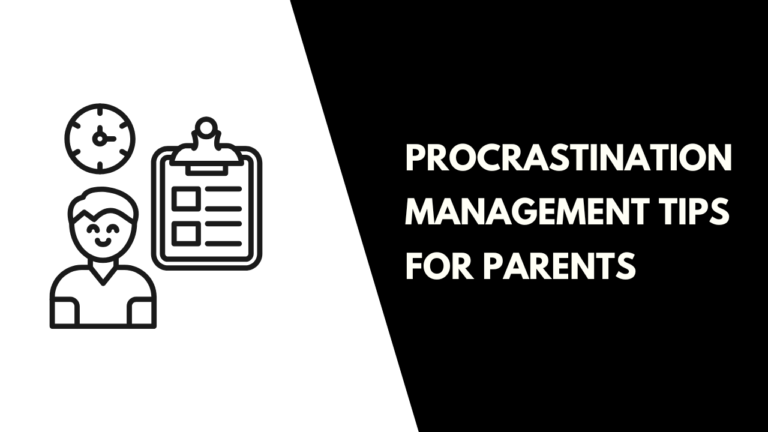How to Help Your Teenager Stop Procrastinating
Introduction – Help Your Teenager Stop Procrastinating
Have you noticed your teenager constantly putting off homework until the last minute? Do they delay studying for exams, miss deadlines, or procrastinate on chores? If so, you’re not alone. Procrastination is a common struggle among teenagers, but the good news is that you can help your teenager stop procrastinating with the right approach.
Table of Contents
ToggleAs a parent, you might feel frustrated watching your teen waste time on social media, video games, or Netflix instead of focusing on important tasks. However, nagging or punishing them won’t solve the problem. Instead, understanding why they procrastinate and providing them with tools to manage procrastination effectively can bring lasting change.
In this guide, we’ll explore why teens procrastinate, real-life examples, and actionable strategies to stop procrastination before it becomes a lifelong habit.
Why Do Teenagers Procrastinate?
Before you can help your teenager stop procrastinating, it’s crucial to understand why they do it in the first place. Procrastination isn’t just about being lazy; it often stems from deeper psychological and emotional factors. Here are some common reasons:
1. Fear of Failure
Many teens procrastinate because they are afraid they won’t do well. Rather than facing potential failure, they avoid the task altogether.
👉 Example: Sarah, a high school sophomore, delays working on her math assignments because she struggles with the subject. She convinces herself that she’ll “start tomorrow,” but tomorrow never comes. Her fear of getting a bad grade keeps her from even trying.
2. Lack of Motivation
Teens often struggle to see the relevance of schoolwork. If a subject doesn’t interest them, they are less likely to put effort into it.
👉 Example: Ryan loves playing guitar but finds history class boring. Instead of studying for his test, he spends hours watching YouTube tutorials on playing rock music. His lack of motivation for history leads to chronic procrastination.
3. Poor Time Management
Teenagers often don’t know how to prioritize tasks or estimate how long something will take. They underestimate deadlines and assume they have plenty of time.
👉 Example: Emma has a week to complete her science project, but she believes she can finish it in a few hours. She keeps postponing it until the night before the deadline, resulting in a rushed and poorly executed project.
4. Distractions Everywhere
Social media, video games, and texting make it incredibly difficult for teens to focus. With constant notifications, their attention gets easily diverted.
👉 Example: Jason sits down to study but keeps checking his phone for messages. What was supposed to be a 30-minute study session turns into an hour of scrolling through Instagram.
5. Perfectionism
Some teens delay starting tasks because they feel the need to do everything perfectly. This pressure to be flawless can lead to avoidance.
👉 Example: Lily spends hours researching for her English essay but never actually starts writing. She’s afraid that if it’s not perfect, she’ll disappoint her teacher.
How to Help Your Teenager Stop Procrastinating
Now that we understand why teenagers procrastinate, let’s discuss actionable strategies to help your teenager stop procrastinating and develop better habits.
1. Teach Them the Power of “Just Start”
Many teenagers procrastinate because they feel overwhelmed. Encourage them to take the first small step—just starting can break the cycle of procrastination.
✅ How to do it:
- If they struggle with writing an essay, ask them to just write one sentence.
- If they need to clean their room, tell them to pick up just one item.
- If they have a big project, have them work on it for just 5 minutes.
This simple trick helps overcome the mental resistance to starting.
2. Help Them Break Tasks Into Smaller Steps
Large projects feel overwhelming, which leads to procrastination. Teaching your teen to break tasks into smaller, manageable steps can make them feel more achievable.
✅ How to do it:
- Instead of writing a 5-page essay all at once, break it into:
- Research (Day 1)
- Outline (Day 2)
- Write one page per day
- Instead of cramming for a test, study 20 minutes each day.
By focusing on small tasks, they will find it easier to manage procrastination and complete their work.
3. Create a Study-Friendly Environment
Teens are easily distracted, so setting up a productive workspace can make a big difference in helping them focus.
✅ How to do it:
- Keep their study area clutter-free.
- Remove distractions like phones and TV.
- Use apps like “Forest” or “Pomodoro Timer” to encourage focused work.
By controlling their environment, you help them stop procrastination caused by distractions.
4. Use the “Pomodoro Technique”
This time-management method helps teens work in short bursts, making tasks feel less overwhelming.
✅ How to do it:
- Set a timer for 25 minutes.
- Work on a task with full focus.
- Take a 5-minute break.
- Repeat the cycle.
This method helps teens stay productive without feeling drained.
5. Encourage Goal Setting and Rewards
Teens are more likely to stay motivated if they have clear goals and rewards for completing tasks.
✅ How to do it:
- If they finish their homework, they can watch an episode of their favorite show.
- If they complete a big project, they can go out with friends.
- Use a checklist and cross off tasks as they complete them—it gives a sense of accomplishment.
Having incentives makes it easier to manage procrastination effectively.
6. Help Them Develop a Routine
A structured daily routine helps prevent procrastination by creating consistency.
✅ How to do it:
- Set a specific time for homework each day.
- Encourage regular sleep schedules (lack of sleep leads to low focus).
- Include breaks to avoid burnout.
A routine creates a sense of discipline and makes it easier to complete tasks on time.
7. Be Supportive, Not Judgmental
Teens often procrastinate due to stress or anxiety. Instead of scolding them, provide emotional support.
✅ How to do it:
- Acknowledge their struggles and offer encouragement.
- Help them problem-solve instead of blaming them.
- Share your own experiences with procrastination and how you overcame it.
When they feel supported rather than judged, they are more likely to adopt positive changes.
8. Lead by Example
Your teen is watching you, even if they don’t admit it. If you procrastinate often, they will too.
✅ How to do it:
- Demonstrate good time management in your own life.
- Set deadlines for your tasks and stick to them.
- Share your strategies for overcoming procrastination.
Being a role model makes a powerful impact on their behavior.
Conclusion
Helping your teen overcome procrastination isn’t about forcing them to work harder—it’s about equipping them with the right tools and mindset to succeed. By understanding why they procrastinate and applying strategies like breaking tasks into smaller steps, setting goals, using the Pomodoro technique, and creating a productive environment, you can help your teenager stop procrastinating effectively.
Every teen is different, so be patient and supportive. With consistent guidance, they can develop strong habits that will serve them well into adulthood.
Do you have any experiences with helping your teen manage procrastination? Share your thoughts in the comments below! 🚀
“Stop postponing your dreams! From Delay to Done is your ultimate guide to conquering procrastination. Grab your copy today on Amazon!






